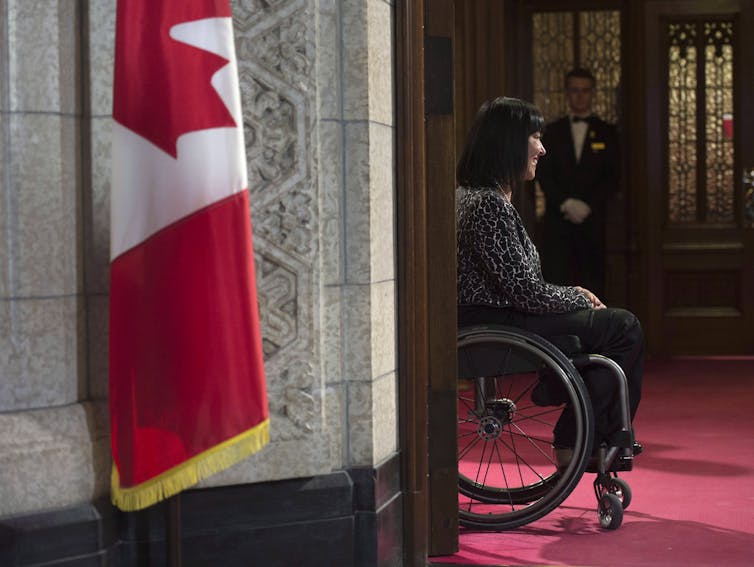- Home
Edition
Africa Australia Brasil Canada Canada (français) España Europe France Global Indonesia New Zealand United Kingdom United States Edition:
Global
Edition:
Global
- Africa
- Australia
- Brasil
- Canada
- Canada (français)
- España
- Europe
- France
- Indonesia
- New Zealand
- United Kingdom
- United States
 Academic rigour, journalistic flair
Academic rigour, journalistic flair
 U.S. President Donald Trump speaks to reporters on Air Force One on his way to his Mar-a-Lago estate in Palm Beach, Fla., on Nov. 14, 2025. He called a Bloomberg reporter a ‘piggy’ when she asked a question during this exchange about the Epstein files.
(AP Photo/Manuel Balce Ceneta)
‘Quiet piggy’ and other slurs: Powerful men fuel online abuse against women in politics and media
Published: November 24, 2025 4.40pm GMT
Tracey Raney, Toronto Metropolitan University
U.S. President Donald Trump speaks to reporters on Air Force One on his way to his Mar-a-Lago estate in Palm Beach, Fla., on Nov. 14, 2025. He called a Bloomberg reporter a ‘piggy’ when she asked a question during this exchange about the Epstein files.
(AP Photo/Manuel Balce Ceneta)
‘Quiet piggy’ and other slurs: Powerful men fuel online abuse against women in politics and media
Published: November 24, 2025 4.40pm GMT
Tracey Raney, Toronto Metropolitan University
Author
-
 Tracey Raney
Tracey Raney
Professor, Politics and Public Administration, Toronto Metropolitan University
Disclosure statement
Tracey Raney receives funding from the Social Sciences and Humanities Research Council of Canada (SSHRC).
Partners
Toronto Metropolitan University provides funding as a founding partner of The Conversation CA.
Toronto Metropolitan University provides funding as a member of The Conversation CA-FR.
View all partners
DOI
https://doi.org/10.64628/AAM.9p6qxk5vs
https://theconversation.com/quiet-piggy-and-other-slurs-powerful-men-fuel-online-abuse-against-women-in-politics-and-media-270435 https://theconversation.com/quiet-piggy-and-other-slurs-powerful-men-fuel-online-abuse-against-women-in-politics-and-media-270435 Link copied Share articleShare article
Copy link Email Bluesky Facebook WhatsApp Messenger LinkedIn X (Twitter)Print article
Tuesday is the International Day for the Elimination of Violence against Women and the beginning of 16 days of activism against gender-based violence. It’s a global call to action by the United Nations to prevent and eliminate all forms of violence against women and girls.
This year’s theme — “End digital violence against all women and girls” — aims to draw attention to the rapid rise of hate directed at women online. Sadly, this problem is all too common in today’s political world.
Why do we need attention drawn to this issue in politics?
Technology-facilitated gender-based violence is a serious and growing threat to women and girls. It’s defined by the UN as:
“Any act that is committed, assisted, aggravated, or amplified by the use of information communication technologies or other digital tools that results in or is likely to result in physical, sexual, psychological, social, political, or economic harm, or other infringements of rights and freedoms.”
It includes hate speech, violent threats, cyber-harassment, doxxing, image and video-based abuse, astroturfing, gendered disinformation and defamation.
Silencing prominent women
Marginalized women and women with public-facing roles — especially politicians, journalists and activists — often bear the brunt of attacks, with the intent to silence and push them out of the public arena.
While popular assumptions about online misogynists view them as “bearded white dudes in a basement” ranting about women on their computers anonymously, some political leaders are also unfortunately spreading misogyny openly online.
What motivates leaders to spread gendered hate online?
Politicians who are most likely to use misogynistic rhetoric are those who seek to uphold a “masculinist strongman ideal,” according to research by British scholar Nitasha Kaul. She explains how public figures like Donald Trump, Vladimir Putin and Narendra Modi have all used misogyny to assert their power.
 U.S. President Donald Trump greets Russian President Vladimir Putin before an ostensible peace meeting in August 2025 in Alaska.
(AP Photo/Julia Demaree Nikhinson)
U.S. President Donald Trump greets Russian President Vladimir Putin before an ostensible peace meeting in August 2025 in Alaska.
(AP Photo/Julia Demaree Nikhinson)
By positioning women (and men who do not conform to dominant masculine norms) as inferior, strongmen are signalling their dominance to their followers and to other “strong” men.
When it’s directed at women in the public eye, political misogyny serves to suppress the voices of political opponents and people with differing views, posing threats to freedom of expression and fundamental human rights.
Read more: Why some populist supporters want a strong-arm leader and others just want change
American public policy scholar Suzanne Dovi explains how political misogyny unfolds through an evolving process, and includes three stages:
- Political elites advance “nasty claims” about high-profile women in politics;
- Those “nasty claims” connect with and/or activate conscious and unconscious prejudices regarding women in politics; and finally
- The audience receives and accepts the nasty claims as their own.
Online political misogyny is violent
Given their vast reach, digital platforms have become ideal spaces for leaders to spread their misogynistic views. In 2017, a Conservative MP referred to former environment minister Catherine McKenna as “Climate Barbie” on social media (the MP later apologized).
Since then, McKenna has shared details about the online violence she experienced in connection with this slur, with one meme featuring a Barbie Doll being crushed by a sledgehammer and another saying, “Tick Tock, Barbie Bitch.”
In 2023, former Conservative leader Andrew Scheer shared a post on his X account (which today has more than 250,000 followers) styled as a “wanted” poster, featuring the photos and office phone numbers of two women senators.
He urged his followers to call their offices, falsely claiming they had deliberately shut down debate on a Conservative-backed bill. Afterward, Sen. Bernadette Clement, who identifies as Black, received racist online abuse and a phone call from an unknown man threatening to come to her home. Sen. Chantal Petitclerc also reported her office being inundated with sexist voicemail messages.
 Sen. Chantal Petitclerc poses for a photo before taking her place in the Senate on Parliament Hill in Ottawa in April 2016.
THE CANADIAN PRESS/Adrian Wyld
Sen. Chantal Petitclerc poses for a photo before taking her place in the Senate on Parliament Hill in Ottawa in April 2016.
THE CANADIAN PRESS/Adrian Wyld
‘Play dirty’
Women journalists are also being attacked, fuelled by misogynistic online posts from political leaders. In 2021, several Canadian women journalists — almost all of whom were racialized — were targeted by an online hate campaign encouraged by Maxime Bernier, leader of the People’s Party of Canada.
After the journalists raised questions about white supremacy inside the party, Bernier told his X followers to “play dirty” with them. The reporters were subsequently inundated with rape and death threats, as well as racist abuse. While X forced Bernier to take down the post and briefly restricted his account, the damage had been done.
In the United States, Trump has frequently relied on gendered attacks on women journalists as a way to humiliate, discredit and silence them. Just recently, Trump responded to a question from a woman journalist by telling her “quiet, piggy.” He has previously described women journalists as “dogs and pigs.”
The cost of online political misogyny
Online political misogyny has real-world consequences. After Trump’s Nov. 20 Truth Social post inciting violence against his Democratic rivals, congresswoman Jasmine Crockett’s office in Washington, D.C., was threatened by a white supremacist.
Writing on Blue Sky, Crockett vowed she would not back down and reminded the public that “when leaders promote hate, hate shows up — sometimes right at our door.”
As my research with Canadian political science professor Cheryl Collier shows, gender-based violence in politics has democratic costs, diminishing diverse voices and expertise in public office.
Read more: Another barrier for women in politics: Violence
In journalism, research by Australian scholar Julie Posetti and her colleagues at the International Center for Journalists shows that online attacks against women reporters have a chilling effect, reducing their willingness (along with those of their sources, colleagues and audiences) to participate in public debate.
These attacks also undermine journalistic accountability and trust in facts during a time when mis- and disinformation have become a scourge.
How to bring about change
The UN’s global campaign challenges us to reflect on how online political misogyny can be stopped. Worldwide, governments must pass public policies and enforce laws that criminalize hate-motivated digital violence. Technology companies must ensure platform safety and enforce robust, transparent codes of conduct.
Men and boys need access to mental health support and positive role models who encourage healthy forms of masculinity, rather than framing toxic masculinity as the ideal. Concerned citizens can donate to organizations dedicated to eradicating gender-based violence, such as the Native Women’s Association of Canada, WomanACT, White Ribbon or to a women’s shelter in their local community.
Finally, public leaders must actively refuse to engage in political misogyny and lead efforts to uphold respect and civility in public discourse. Campaigns like Gov. Gen. Mary Simon’s “Building a Safer and Respectful Digital World” and Elect Respect, initiated by Burlington Mayor Marianne Meed Ward, are positive steps in the right direction.
- Donald Trump
- Gender-based violence
- Andrew Scheer
- Maxime Bernier
- Online violence
- Catherine McKenna
- violence against women and girls
Events
Jobs
-
 Analyst, Student Information and Regulatory Reporting
Analyst, Student Information and Regulatory Reporting
-
 Lecturer in Paramedicine
Lecturer in Paramedicine
-
 Associate Lecturer, Social Work
Associate Lecturer, Social Work
-
 Lecturer, Communication Design
Lecturer, Communication Design
-
 Leading Research Centre Coordinator
Leading Research Centre Coordinator
- Editorial Policies
- Community standards
- Republishing guidelines
- Analytics
- Our feeds
- Get newsletter
- Who we are
- Our charter
- Our team
- Partners and funders
- Resource for media
- Contact us
-
-
-
-
Copyright © 2010–2025, The Conversation

 Analyst, Student Information and Regulatory Reporting
Analyst, Student Information and Regulatory Reporting
 Lecturer in Paramedicine
Lecturer in Paramedicine
 Associate Lecturer, Social Work
Associate Lecturer, Social Work
 Lecturer, Communication Design
Lecturer, Communication Design
 Leading Research Centre Coordinator
Leading Research Centre Coordinator



